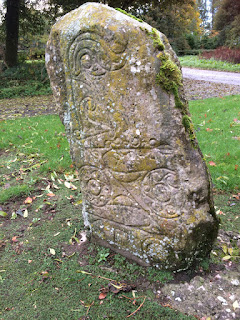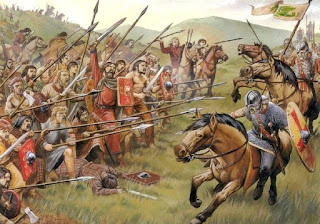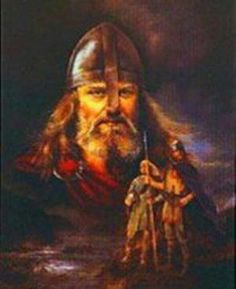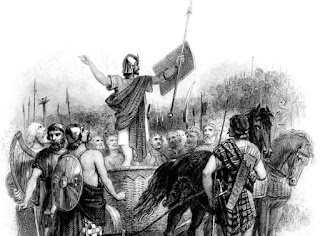King Bridei
Our forgotten Pictish King
The Battle of Dunnichen
If the Pictish army led by King Bridei had lost to the invading Angles at the Battle of Dunnichen, then Scotland as we know it today simply would not exist. It was one of the most important battles of our early medieval history, and this is reflected in the fact that we know more about it than any other single event in 7th century Scotland.
The Picts destroyed King Egfrith's Anglian army from Northumbria on May 20, 685, and their resounding victory helped form the political landscape of northern Britain for 200 years. They recovered territory, including Fife, which the Angles had occupied for almost 30 years.
There had been a Pictish rebellion. against Northumbrian control in 672, which had ended in bloody defeat. Northumbrian sources luridly, though probably with exaggeration, tell us that the victors were able to cross dry-shod over two rivers, so full were they of the bodies of slain Picts.
These rivers were the Carron and the Avon, near present-day Grangemouth. During much of this time, the border between Northumbria and Pictland was probably the Tay.
The Battle of Dunnichen ensured that this border was pushed south to its earlier position on the Firth of Forth, and it remained there until the disappearance of the Pictish realm towards 900, and the emergence of the new kingdom of the Scots. But in 685 King Egfrith was so sure about his control of southern Pictland that the Northumbrian Church had even founded a bishopric to look after its new ecclesiastical province. It was based at Abercorn on the southern shore of the Forth.
But the new bishop, Trumwine, felt so insecure after his king's defeat and death at Dunnichen that he and his household fled southwards, and that was the end of the bishopric of Abercorn. Because the battle was so well-known among all the peoples of the north, each had its own name for it. The Irish annals call it the battle of Dun Neachtain - Nechtan's hill fort – which is the origin of the modern parish and village name Dunnichen.
We do not know the Nechtan who is being referred to here, but it was the name of several Pictish kings, including Bridei's grandfather.
Dún Neachtain may well have been a royal stronghold in the 7th century. It applied originally to the hill and hill-fort overlooking the site of the battle.
The defeated Angles called the battle site Nechtansmere - Nechtan's loch. It refers to the same Nechtan, but with the emphasis on the low-lying wetlands where the battle actually took place.
But what name did the Picts themselves give to the battle?
The most obvious would be the Pictish equivalent of Dun Neachtain, something like Dun Naiton.
However, the Welsh-speaking British of Strathclyde and Dunbartonshire called it the battle of Linn Garan, we know that the Pictish language is closely related to Welsh, so it is likely that the British got this name from the Picts. It refers, of course, to that body of water called Nechtansmere by the Angles.
We know nothing about the general strategy of the battle, beyond the fact that the Northumbrians fell into some kind of trap, lured into an ambush by a group of Pictish warriors pretending to flee. The Northumbrian army may have been advancing up Strathmore from Perth, as Graeme Cruickshank suggests in his detailed booklet on the Battle of Dunnichen – and so would have been diverted from their route just north-east of Forfar.
It is quite possible that they were aiming for the key Pictish fortress of Dunnottar on the coast south of Stonehaven.
From whatever direction the Northumbrians approached Dunnichen, they certainly found themselves in a very dangerous position, between the high-ground of Dunnichen Hill occupied by the full strength of the Pictish army on one side, and a boggy loch on the other.
It is ironic that we know much less about the victorious king Bridei, the son of Bile, than about his defeated enemy, Egfrith. The two kings were cousins, scarcely surprising given the importance of marriage alliances among ruling dynasties of neighbouring kingdoms.
Bridei was proclaimed king – in at least part of Pictland – after the Pictish defeat at the hands of Northumbrians in 672. In the 13 years between becoming king, and the Battle of Dunnichen, we have only one brief mention of him in the annals. That was in 682 when he laid waste to Orkney. This may have been part of his strategy to unite, by force if necessary, all the Pictish peoples under one king, with the long-term aim of ousting the Northumbrians from occupied Pictish territory.
After Dunnichen, he remained king until his death in 693, and was buried on lona.















Comments
Post a Comment